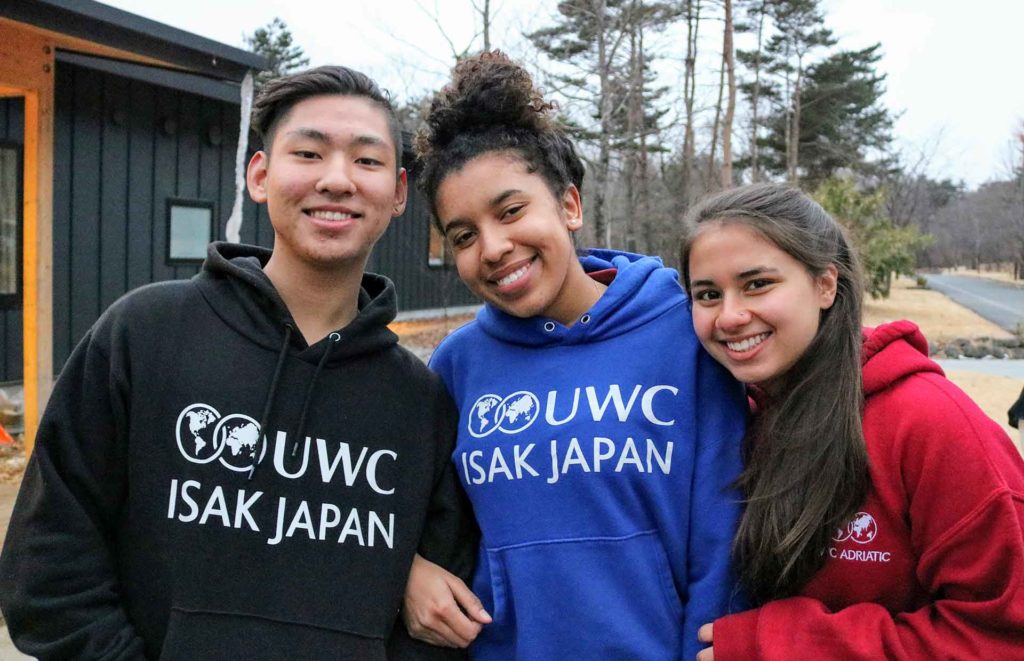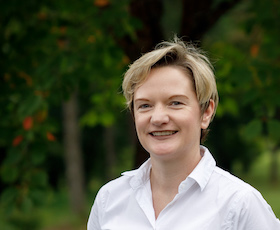本校では、生徒がいつでも安全で、必要なサポートを受けることができると感じられる環境づくりを最優先に考えています。本校が取り組むセーフガーディング対策は、生徒の健全な育成を保証するためのものです。このページでは、私たちのセーフガーディングに対するアプローチやチーム体制、ポリシー、そしてUWC全体の共通基準についてご説明します。
本校のパストラル・ケアに関するステートメント(2022年度)はこちら
セーフガーディングに対する私たちのアプローチ
生徒の安全を守ることは、本校に関わる全ての人が共有する責任であると考えています。UWCのコアバリューである個人の責任、誠実さ、自主性、相互責任、敬意、そして思いやりに基づき、本校コミュニティの全員が日々安全と尊重を感じられるようさまざまな取り組みを行っています。セーフガーディングの対策は、授業、野外教育、寮生活、そして今後開設予定のヘルス&ウェルネスセンターの運営など、あらゆる面で生徒が安心して過ごすことのできる環境作りを推進しています。

チーム体制
セーフガーディングに取り組む本校の担当チームは、生徒の安全と必要なサポートを提供できるよう専門家たちで構成されています。チーム体制は以下の通りです:

Michelle Rutter

Kyle Morgan Thomas

Mariana Muniz
生徒の生活環境に関して不安がある場合は、担当チームまでご連絡ください ([email protected])。
本校のセーフガーディングポリシー
私たちのポリシーは、本校のコミュニティ全員の健全性と安全に対する揺るぎない責任を反映して作られています。これは、あらゆる形態の虐待、ネグレクト、搾取、暴力から保護されるべき全ての子供の権利を強調する、国連の「児童の権利に関する条約」の原則に沿ったものです。UWCのコアバリューである個人の責任、誠実さ、自主性、相互責任、敬意、そして思いやりを重んじ、本校の理事会では、在校生、卒業生、運営責任者、教職員、そしてゲストを含む本校に関わる全ての人々に対して、安全で、互いに尊重される環境を保証しています。
また、私たちは不適切な行動に対してゼロ・トレランスの方針を維持し、全てのコミュニティーメンバーの権利と福祉を保護する環境を作り上げることに精力的に取り組んでいます。さらに本校の理事会は、セーフガーディングポリシーの有効性とコミュニティの進化するニーズの整合性を確認するために、ポリシーの年次レビューを行い、全ての人々に安全と成長を促すことのできる環境を提供するというコミットメントを強化しています。
本校のセーフガーディングポリシーを見るには、ここをクリックしてください。

UWCの共通基準
本校は、全てのUWC加盟校が遵守すべき共通の原則とガイドラインをまとめた、「UWC Common Standards for Safeguarding(UWCのセーフガーディングに関する共通基準)」に従っています。この基準は、UWC全体で保護に対する一貫したアプローチを保証し、世界中の生徒たちが安全にサポートを受けられる環境作りに寄与しています。
(英語版のみ)
In this document the following words or phrases shall have the meanings indicated below:
“UWC Movement” or “Movement” means the United World College Movement.
“Board” means the UWC International Board.
“International Office” means the international office of UWC International.
“UWC International” means UWC International, the company limited by guarantee, which is a registered charity in the England and Wales under the name “The United World Colleges (International) Ltd”.
“Student” means a person attending a UWC School/ College for a period of study. It also includes, for the purposes of this document, all applicants for places at UWC Schools/Colleges, and participants or applicants for places at any UWC Short Course organised by any Entity.
“Abuse” means all forms of action or inaction which can result in harm for a Student. The types of Abuse are set out in detail in Annex 1 to this document.
“Entity” means each UWC School/College, National Committee and other committee, association or organisation which uses the title UWC with the consent of the UWC Movement.
“Standard Policies and Procedures” means the set of policies and procedures approved by the Board and made available to all Entities for their use, if required.
“DSL” means a person (by whatever title) who fulfills the role of a Designated Safeguarding Lead in any Entity. A DSL has oversight and responsibility for ensuring that policies and procedures are in place and operate in practice and is the first contact point in the event of a referral.
“UWC School/College” means any school or college which uses the letters “UWC” within its name with the authority of the UWC Movement as confirmed by UWC International.
“UWC Short Course” means a short course organised and facilitated by an Entity.
“Common Standards” means the UWC safeguarding common standards set out in Section 5 hereof.
“NC” or “National Committee” means any committee which is established in any form in any country or territory and which has been approved and accepted by the International Board of the UWC Movement and which is entitled to nominate Students for places at UWC Schools/Colleges and to use the letters UWC in its title. Some NCs organise UWC Short Courses. NCs are Entities as defined in this document.
“Nominated Individual” means the person appointed within any UWC Entity who is part of the governing body of that Entity and who shall have oversight into any Abuse Concerns. In the event that the Entity is not of a size or organisation to make such appointment then UWC International may, at the request of the Entity, nominate the individual to fill that role. Such individual may be a member of the International Office staff.
- The Board regards the wellbeing of all involved in the UWC Movement as a key part of the Movement’s ethos and values.
- The Board expressly acknowledges and honours the nature of UWC Entities as separate and independent legal bodies governed by regulation in their respective countries and connected to UWC International through memorandums of understanding governing a relationship of mutual trust, mindful of the diverse nature of Entities. In adopting the Common Standards for safeguarding the Board intends to assist each Entity to take all reasonable steps to keep the Students safe.
- Keeping in mind the UWC Movement’s commitment to student autonomy and responsibility and to creating contact and meaningful engagement between children, young adults and adults, the Board’s safeguarding approach as set out in this document is one which expects each Entity to:
• have policies and procedures in place in line with or exceeding the Common Standards set out in Section 5;
• educate and enable Students – to the extent appropriate to their age – to live safely and to look after their own wellbeing; and
• to have adequate mechanisms of support and reaction in place in cases of concern or complaints. - The Board expects all Entities to share its commitment to safeguarding, so that all Students shall be emotionally and physically safe and free from any Abuse.
- The Board and the UWC Movement are committed to appropriate standards of professional behaviour and personal practice so as to minimise the risk of harm through Abuse to Students as a result of, or in connection with, their involvement with any Entity.
- Whilst the Board acknowledges that it is never possible to reduce the risk of Abuse to zero, the aim of the safeguarding approach as set out in this document is for the risk to be reduced as far as reasonably possible, in a manner consistent with the educational objectives of the UWC Movement (of personal trust and responsibility, student autonomy, independence and service as well as personal warmth, which are essential to a UWC education). This acknowledgement, however, can never excuse any Entity from doing everything reasonable in its power to respond to and address any incident of Abuse within the Entity’s area of operation.
- The UWC Movement is concerned with providing a holistic education to Students from approximately 160 countries and territories, and in 17 countries across the globe. There is an environment of deliberate diversity created within each UWC School/College, and the process for locally selecting Students involves NCs in approximately 160 countries and territories.
- All Entities should be able to show they have common standards in place that are applied in practice. This document and the Common Standards as set out in Section 5 are not a prescriptive set of policies: given the huge differences in culture, legal standards and processes across the UWC Movement, such policies would not be possible. Each Entity must, however, in accordance with the principles set out in Section 3 hereof, have its own safeguarding policies and procedures in place which must not be less rigorous than the Common Standards.
- In establishing these Common Standards, the Board is aware of the fact that UWC Schools/Colleges are accredited by or are about to receive formal accreditation from an internationally recognized accreditation body. The Board is satisfied that, as part of the accreditation process and associated monitoring, it will be confirmed that the UWC School/College has the necessary policies and/or procedures in place and applies them in practice. The fact of a UWC School/College having such accreditation in force at any time shall give rise to a presumption that that UWC School/College has in place both documentation and practice no less rigorous than these Common Standards, in line with point 4. B above.
The Common Standards in connection with safeguarding to be applied by all Entities (including UWC International) can be considered under the following headings:
A. The Safeguarding Paperwork
Each Entity must have in place a set of policies and procedures no less rigorous than the Common Standards. Entities must ensure that:
• all safeguarding paperwork is kept under review regularly and systematically; and
• that the safeguarding paperwork is in compliance with the laws of the country or territory where the Entity is situated.
B. The Safeguarding Culture
Each Entity shall ensure that its policies and procedures are applied in practice and understood and followed by all involved in that Entity, including governing bodies, teachers, administrative staff, interns, host families and volunteers and, as far as is age-appropriate and achievable, all the Students involved with the Entity.
C. The Preventative Action
This will make the occurrence of any Abuse within that Entity less likely. This must include:
- Appointment of a DSL, who shall be the individual who has overall responsibility for ensuring that paperwork is kept up to date and under review and is the point of contact for any who are subject to or fear Abuse, are concerned that Abuse may be occurring in respect of others. There shall be procedures to ensure that in the absence of the DSL, or should any concerns relate to the DSL, then another fills that role, and to ensure that all Students are aware of who to contact if they are concerned about any safeguarding issue;
- Appointment of a Nominated Individual within the governance of the Entity who shall have oversight into the area of safeguarding and who shall be informed of any safeguarding issues or concerns that arise in respect of the Entity;
- Applying safe recruitment practices including making appropriate checks on the members of governing bodies, teachers, administrative staff, interns, host families and volunteers. Active and verified references should be required for all staff. Safe recruitment practices should also be applied to adults living with the above, who may have unsupervised access to Students involved with the Entity;
- Ensuring that any contractors or providers of outsourced workers who have potential unsupervised contact with Students in connection with the Entity have verifiable safe recruiting practices in place;
- Ensuring that, to the extent reasonable, those who have regular unsupervised contact with Students within the Entity are trained to ensure they understand the nature and risks of Abuse;
- Having a sensitive but clear code of behaviour in place to minimise the opportunities for all in contact with Students to perpetrate Abuse or to be subject to accusations of Abuse perpetration. Such a code of behaviour shall be designed not to compromise the UWC educational experience and age-appropriate autonomy;
- Making that Entity’s commitment to safeguarding known publicly;
- Taking all reasonable and practical steps to ensure that any building or premises of the Entity or used by the Entity is organised in a manner that provides appropriate and reasonable security for any Students involved without losing the essential freedoms valued by the UWC Movement;
- Ensuring that all involved with the Entity, including Students, are informed of what to do if they feel uncomfortable or have concerns about Abuse or possible Abuse;
- Including in any education of Students measures that help them understand the nature of Abuse. This is considered of importance as many issues of Abuse can involve interaction between Students who may not, without appropriate training, understand the Abusive or potentially Abusive nature of their actions; and
- Applying appropriate routines for visitors and any others who work with the UWC Entity to minimise the risk of abuse and to avoid, to the extent reasonable, that they spend any significant time alone with Students where they cannot be overseen.
D. The Identification of Abuse or Potential Abuse
This must include:
- The training of staff so that:
- they understand the nature of Abuse and the indicators of possible Abuse taking place;
- they know how to respond to a Student who informs them of Abuse or of suspected or potential Abuse; and
- they understand that all matters of Abuse or of suspected or potential Abuse must be brought to the attention of the DSL and that the DSL should be consulted even if they are unsure as to whether a matter has to be reported.
- The inclusion of training in learning for all Students who have connections with the Entity in circumstances where it is possible that they might be subject to Abuse, so that they are:
- aware of the nature of abuse, whether it comes from adults or other Students; and
- aware of who they should talk to in the event of their feeling uncomfortable as a result of any actions or inactions taken by someone involved with the Entity.
- The training of staff so that:
E. Action in Connection with Abuse and Suspected or Potential Abuse
This must include each Entity providing that there will be:
- prompt action to address any risk, even if unproven at that stage, on the basis of the precautionary principle, to keep the Student potentially concerned or any other Students, other children or young people safe. This may involve the suspension or removal of any person about whom concerns have been raised. The first principle is ensuring safety. As this can impact severely on those who may or may not be involved, investigation and resolution should follow so that the issue can be resolved fairly and with all due speed;
- action in accordance with the legal and other Common Standards of the country or territory where the Entity is established;
- action to remove any person who, after due investigation, is identified as a perpetrator of Abuse from a position where they can harm any Student. This should provision to ensure that the Entity takes reasonable action to avoid the individual concerned continuing to be a risk to Students or children in the future either at the Entity or beyond;
- action in the event that the perpetrator or alleged or potential perpetrator is a Student to ensure that they do not constitute a further risk to other Students involved with the Entity. The Entity should have a disciplinary code or other procedure to ensure that such a Student is dealt with fairly, remembering that the Entity also owes them a duty of care. That Student is always entitled to be treated in a way that causes them as little harm as possible, consistent with the law of the country or territory where the Entity is situated and the need to keep other Students safe. The Entities provisions should note that it may be in that Student’s interests for help to be sought at the earliest possible opportunity so that decisions made are the best available in that Student’s interest (further details are contained in the guidelines on safe UWC campuses); and
- notification of the International Office in respect of any severe safeguarding incident which, if established as true, should result in disciplinary action against a staff member, or expulsion of a Student, or criminal action against a person who is neither staff nor a Student. In the case of expulsion of a Student, the relevant National Committee shall also be notified. Such reports will enable the UWC Movement as a whole to be aware of any patterns or particular risks which should be addressed. The International Office will also be able to identify as early as possible any potential reputational or other risk to the UWC Movement. Notifications received will be treated confidentially unless they have entered the public domain without breach of confidentiality or as otherwise agreed with the parties concerned. f. UWC International and the Board Special Representative on Safeguarding will inform the UWC International Board as well as schools and colleges regarding patterns of abuse or particular risks.
If an individual is not directly affiliated with UWC ISAK Japan or prefers to speak to another UWC entity about an experience of sexual misconduct, harm, abuse or neglect, the reporting mechanisms provided by UWC International can be used:
Contact the Safeguarding Officer of UWC International via email at [email protected]
Use the UWC Safeguarding Support Online Platform
Use the UWC Safeguarding Support Phone Line.
本校のセーフガーディング・プログラムは、私たちが生徒の安全な教育環境を育むという責任において、とても重要な役割を果たします。包括的なポリシーを実施しながら専門チームと連携することで、生徒が成長し、学び、活躍していけるように、健全な育成と保護環境を最優先で保証することに努めてまいります。


